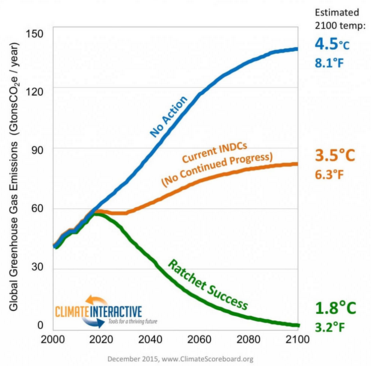
Lecturer Drew Jones detailed his journey to clarify more sustainable greenhouse gas emissions worldwide at a Feb. 16 event hosted by UNC Asheville’s Divestment Coalition.
Jones and members of his company, Climate Interactive, attended the 21st Conference of the Parties to the United Nations Framework Convention on Climate Change for 15 days to display their climate models in front of world leaders and activists.
They sought to add up the emissions reduction pledges from the participating nations and model them to determine if the pledges would be sufficient to moderate global warming by the year 2100.
“We were the buzzkills of Paris,” Jones said.
According to Jones, the reductions committed to at the COP 21 talks by world leaders will result only in a global warming of 3.5 degrees Celsius, instead of the 2 degrees Celsius recommended by many environmental scientists.
“People have been numbed out to how bad it really could be,” Jones said.

In addition to detailing his experience at the COP 21 talks, Jones said he offered advice to the activists in attendance, giving them steps to become more effective advocates.
Focusing on two main points, Jones stressed the necessity of divesting from fossil fuels and the importance of electing officials intent on pursuing stricter carbon emission legislation.
Jones also emphasized students must become ‘agents of change,’ holding elected officials accountable for their actions in regard to climate accords and legislation.
“You are students; you have power,” Jones said.
Ashleigh “Rainbow” Hillen, senior environmental studies student and UNCA divestment leader, introduced Jones and said she found inspiration in his words.
“I thought that it reinforced my attitude towards our capabilities to actually transform our economy if we just put all the bullshit aside,” Hillen said.
Despite Jones’ austere recommendations for greenhouse gas reductions, Hillen said she remained positive about the future of environmental activism.
“We have no other option, and this state of pandemic shortsightedness is not sustainable,” Hillen said.
“We have to figure out how to effectively intervene, and people like Drew are giving us the tools”
Also present at the event was Carolina Arias, senior environmental studies student and co-director of the Student Environmental Center.
“I appreciated Drew using his expertise to give us insight on how the greatest powers of the world are approaching this issue and what it means for the work that we’re doing,” Arias said.
Although optimistic about the possibilities to moderate global climate change, Arias said there was still much to do in order to reach an non-polluting energy equilibrium.
“The necessary reductions feel out of reach as long as the climate talks are dominated by countries that have built their empires through extraction and cannot consider alternatives,” Arias said.


![Brooke Pedersen [second from the right] and Luis Reyes [right] hold banners during the Wrap The Woods event.](https://thebluebanner.net/wp-content/uploads/2025/09/ELIZABETH_PRITCHITT_IMG_3470-1200x804.jpg)















